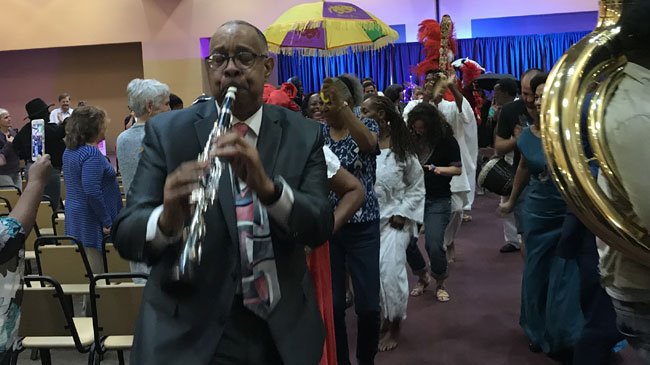
By Piper Thurman
Instruments like drums, trumpets, and tambourines echoed off the walls and The Saints Go Marching In directed the crowd of residents to dance in single file down a second-line on Nov. 4, 2018. Not a single seat in the ballroom in the University Center on Xavier University’s Campus was empty at The Tricentennial: A celebration of 300 years in music.
“By the early 19th Century New Orleans was one of the most musical cities in the world, and what started it all was the rich culture running through African music,” said Jazz Clarinetist Dr. Michael White, who led the tribute.
Other world-renowned performers like Deacon John, Luther Gray, and Wendell Brunious also attended. Starting a successful band called The Ivories is why Deacon John was inducted into the Louisiana Blues Hall of Fame in 2008. He briefly had an acting career, playing in movies like The Last Exorcism and Treme’. Another keeper of the arts, Luther Gray, co-founded The Congo Square Foundation in 1989, an organization dedicated to keeping the culture alive in New Orleans music. Wendell Brunious, another famous musician and bandleader of The Preservation Hall Jazz Band, was a notable trumpeter in New Orleans. They came together to salute the art form as being the definitive contribution of the City to the world.
White, a well-respected jazz clarinetist got his start in music playing for Doc Paulin’s Brass Band and was a recipient of the 2008 National Heritage Fellowship, the highest honor in traditional arts. The Xavier professor discussed how the Civil Rights Era was another prominent time for music in New Orleans. While African-American musicians fought to perfect their craft and to become known for their music, they also fought against the Jim Crow Laws at that time. New Orleans heavily forbid integration, so integrated bands faced restrictions at social functions where African-American musicians were not allowed. Places like New York and Los Angeles were flourishing and became attractive for musicians, triggering a migration from the South.
“Louis Armstrong was one of the first African-American musicians to rise and make a name for himself, for jazz and blues and he put New Orleans on the map,” White said. “His talent made people look beyond his color,” he added.
People from all over the community danced and sang around the ballroom, and many discussed their appreciation for their city, even those that weren’t natives. Jaland Green, who studies pre-medicine at Xavier said he learned not only about music, but about his own history. Although he was born in Detroit, his grandfather played with Motown Records, and always expressed his love and admiration for New Orleans and some of its greats.
“My great-great grandfather was a musician who loved [greats] like Louis Armstrong,” he said, “So being able to almost go on this journey through this New Orleans’ music era today is not only informative, but it makes me even more proud to be Black. Look at how many contributions we have made,” Green said.
New Orleans native and Katrina survivor, Tamela Ross, danced and turned with her beaded umbrella to the rhythm of the trumpets and guitars being played.
“I just love the celebration and sense of community integrated in our music, whether that be through song or through just strictly instruments, we just always find a way to make it more than just music, “Ross said, “It’s in our roots,” she added.
According to White, music in New Orleans doesn’t just sound good, it has helped build the city, and bring people together. Even through the hardest times, something as simple as a little song has brought New Orleans far.
“Music is the life of the city and it has helped us appreciate and celebrate where we come from,” White said. “It brought us back from Katrina and forced people to put race and religion aside the only way New Orleans knows how to – through celebration and music,” White said.
Recommended For You.



Be the first to comment